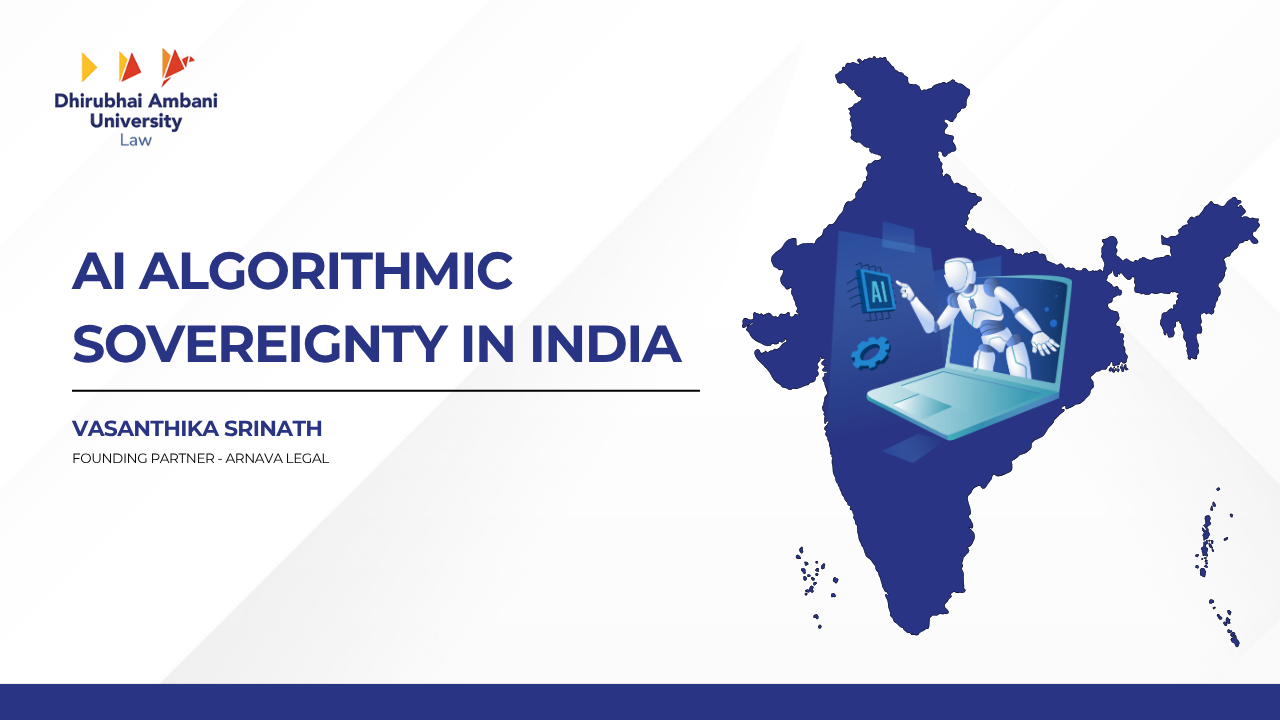By: Vasanthika Srinath
Founding and Managing Partner, Arnava Legal

What is Algorithmic Sovereignty
Algorithmic sovereignty refers to a nation’s or an institution’s ability to independently govern the design, deployment and oversight of algorithmic systems in alignment with its own legal, ethical and cultural values, apart from its economic and social compulsions. It is basically about institutional and national autonomy over the algorithmic logic that shapes citizen experiences, by use of any computer technology. If the logic affects rights of people, governance or strategic autonomy, it falls within the purview of algorithmic sovereignty. While digital sovereignty focuses on data localization and infrastructure control, algorithmic sovereignty emphasizes the power to shape how algorithms operate within a society. This includes the capacity to audit, regulate, and adapt systems to ensure transparency, accountability, and fairness.
With the advancement of AI, we are seeing more discussions on AI algorithmic sovereignty. This concept is also gaining urgency because we are seeing algorithms that increasingly influence decisions in finance, healthcare, law enforcement and even public policy. This discourse assumes greater significance as Artificial Intelligence is rapidly being integrated into Digital Public Infrastructure.
Why does it matter
Without algorithmic sovereignty, states risk becoming dependent on opaque, foreign-developed AI systems that may not necessarily reflect local regulations, values, culture, norms or principles. Additionally, three also are concerns around use of the foreign AI infrastructure and hardware, which may not permit localisation of data. To add to these concerns, there are risks arising from algorithmic bias, surveillance and the centralization of power in proprietary platforms. At a practical level, achieving algorithmic sovereignty involves building domestic technical expertise (both hardware and software) while building enabling and robust regulatory frameworks. Another essential aspect is the ability to foster public trust by promoting digital literacy and participatory governance. Given the fact that algorithmic decisions can possibly shape societal outcomes, it is necessary to ensure that the discourse should be cross functional across law, technology, economics, ethics, culture and geopolitics to be relevant and current. Ultimately, algorithmic sovereignty is about reclaiming control over the invisible architectures that increasingly govern our lives, which are more often than not, driven by state actors. Algorithmic sovereignty isn’t just about owning code, but about controlling the values, data and decision-making logic embedded within the systems.
Algorithmic Sovereignty stems from the broader umbrella of digital sovereignty, but shifts the focus from data ownership to control over how data is processed through algorithms. It refers to the country’s capability to regulate AI systems, along with technological capability to build domestic models and supporting infrastructure while the legal and ethical framework brings these together to ensure that the algorithmic behaviour is aligned with national values, principles, culture and citizen rights. This is essential for self-reliance, rights protection and for strategic autonomy in the digital economy; which assumes a significant role in India’s growing digital economy.
IndiaAI
The IndiaAI Mission is operated by the Ministry of Electronics and IT(Meity) and is being implemented through seven pillars: IndiaAI Compute, IndiaAI Innovation Centre, IndiaAI Dataset platform, IndiaAI Application development initiatives, IndiaAI FutureSkills, IndiaAI Startup Financing, and Safe & Trusted AI.
The aim of the IndiaAI Stack is to create a multi layered framework to create a digital public infrastructure for AI that will support interoperability, data protection and ethical development of AI across various sectors.
India’s Regulatory Framework:
The Information Technology Act, 2000, read with its rules forms the basis of India’s current regulatory framework around its digital ecosystem. It governs cybersecurity, data breaches, provides for content moderation by intermediaries and also provides for mandatory reporting of data breaches to CERT-In. Given the lacuna in this regulation around personal data, the Government passed the Digital Personal Data Protection Act in August 2023 (DPDPA), which however, is still pending notification. The DPDPA, once passed, will govern matters such as consent and lawful processing of personal data and obligations of the data principals, data fiduciaries (including significant data fiduciaries) and data processors.
However, there is lack of clarity around cross border data flows and data localisation under these regulations. Further, these regulations do not address sovereignty concerns, especially around AI algorithms. Currently, these regulations do not address automated decision-making, model explainability, or algorithmic accountability, thereby leaving gaps for regulators and courts to interpret these requirements.
In addition, we are seeing multiple regulators in India trying to fill in the gaps in their respective areas. Niti Aayog is working on regulations and principles to govern AI and promote responsible and ethical AI. The RBI (Reserve Bank of India) has constituted a committee known as the FREE-AI Committee that is focussed on creating a framework around ethical use of AI in financial services. Recently, SEBI (Securities & Exchange Board of India) published a consultation paper for AI / ML Governance Framework to enable investor protection and disclosures, requiring testing AI / ML frameworks to ensure fairness and detect bias and also to align with the SEBI Cyber Security and Cyber Resilience Framework.
On the Health Tech side, ICMR (Indian Council of Medical Research) has published Ethical Guidelines for Application of AI in Biomedical Research & Healthcare, which provide guidance on building responsible AI by focussing on autonomy, safety, trustworthiness, data privacy, accountability, liability, accessibility, equity and inclusiveness, collaboration, non-discrimination, fairness and validity, transparency, among others.
Way forward
Algorithmic sovereignty in India is no longer a theoretical construct—it is fast becoming a regulatory, technological and strategic imperative.
The IndiaAI Mission, along with the potential regulations are a clear indication that the Indian regulators are looking to assert control over how AI algorithms are designed, developed and governed. Sovereignty is not about creating a stand-alone system or isolating the country’s systems. The challenge for the country is in balancing global integration with local accountability, thereby achieving autonomy. To that end, interdisciplinary collaboration between technologists, engineers, lawyers and policymakers will be key in shaping India’s algorithmic future.
